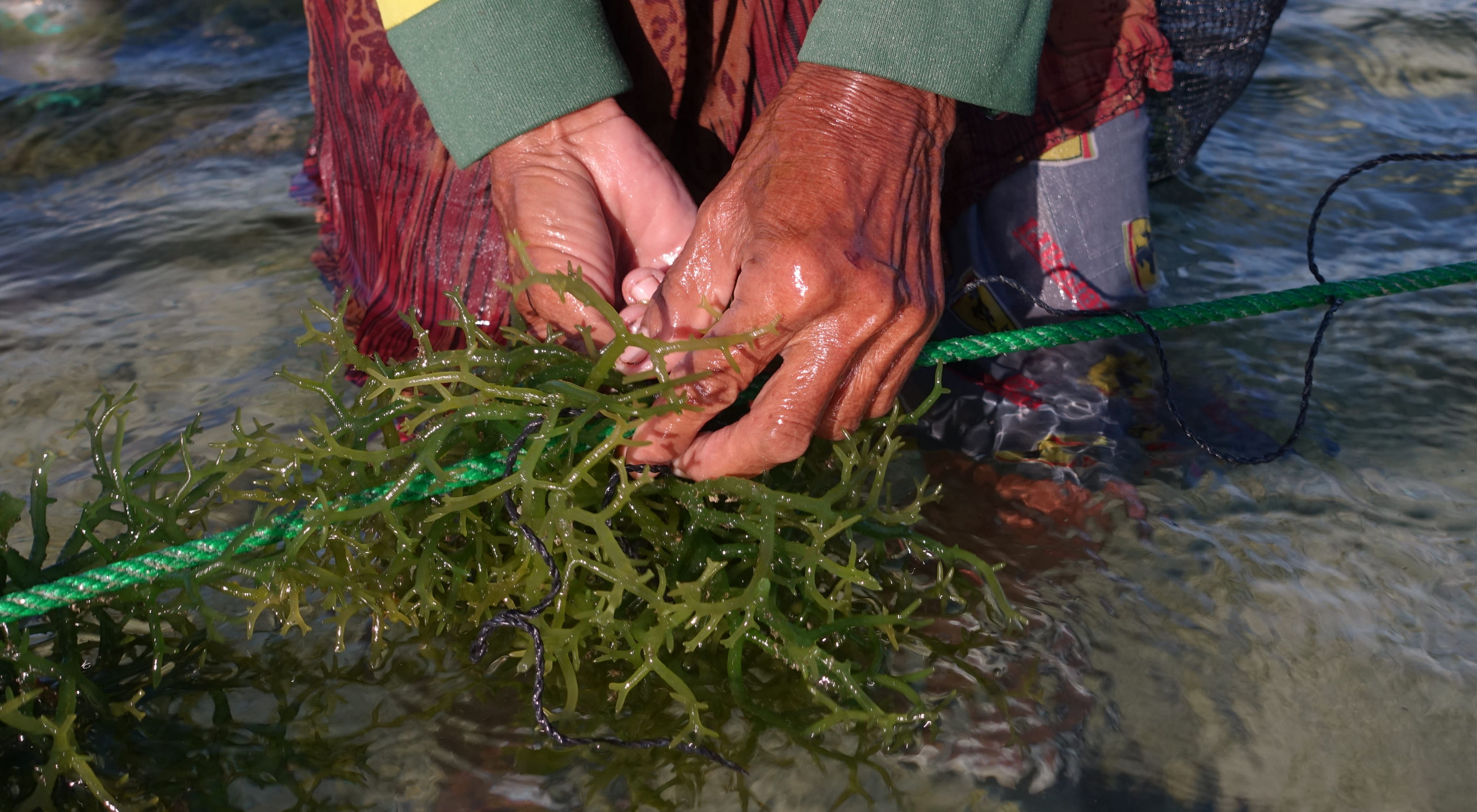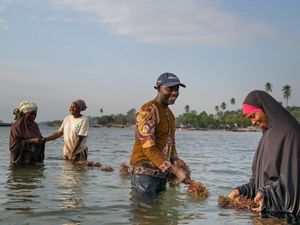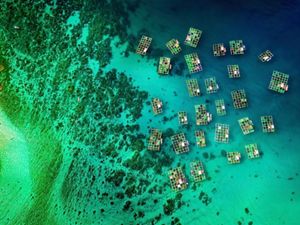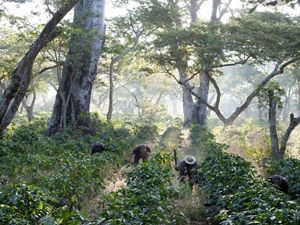Aquaculture Critical for Feeding the World in a Changing Climate
With land-based food production already stretched and the global population continuing to grow, the sea provides crucial opportunities for resilience
By Robert Jones, TNC; Bill Dewey, Taylor Shellfish Farms; and Barton Seaver, Chef & Author
The planet has never been under more pressure to increase food production. And this pressure is only set to grow—by as much as 60 percent over the next few decades. At the same time, climate change is threatening food systems around the world, with major questions about future food supply and security, livelihoods, and human nutrition.
As our planet gets squeezed between these multiple pressures, we need to rethink how we feed people and protect the environment—drastically diversifying crops, improving farming methods, and strategically selecting places in which we grow our food. It’s no longer just about hedging our bets, it’s a vital necessity for our already-taxed, overburdened food production systems.
So, let’s think big—as in 71 percent of the planet big. Our ocean.
Marine aquaculture, the growing of plants and animals in our oceans, is an important source of nutrition—and, research indicates, an emerging climate change solution. Yet it’s often neglected in broader conversations about achieving a regenerative, nature-positive food system, in part because of its perceived history of environmental degradation. But significant advances in technology and practices have made it possible to responsibly manage the sector, and there is real potential for aquaculture to restore environmental health and improve human wellbeing.
A reimagining of how and where we grow our food can make all the difference for our climate future. It’s time we get to work.

Read the New Study
In partnership with University of Adelaide, the new study Climate-Friendly Seafood: The Potential for Emissions Reduction and Carbon Capture in Marine Aquaculture describes the actions marine farmers can take to be influential in reducing impacts of climate change.
Read on BioScience ›
A resilient food system
Right now, growing the vast majority of our food requires land to produce. And almost all of the world’s fertile land is already in use. Our ocean, by contrast, covers nearly three quarters of the planet, yet currently provides just 2 percent of our food. Not only is there room to grow here, there’s room to grow smartly.
Aquaculture in marine environments allows for three-dimensional farming (think: stacking one farm on top of the other). A study projects that if we were to farm seafood instead of land-based meat to meet the growing demand for protein, we could spare an area of land two times the size of India. And growing seafood instead of most other animal proteins also spares a huge amount of carbon—most farmed seafood has about a tenth of the carbon emissions as beef.
On top of preventing additional emissions, aquaculture can also help our food systems better withstand and recover from the effects of climate change that we’re already seeing, like severe droughts and temperature swings. One way to do that is to produce a wider variety of foods that will respond differently to changes. Marine aquaculture adds to a healthy, resilient mix of food sources. Since it’s affected differently by changes in air temperature, rainfall, and soil than land-based agriculture, using this method can help food-producing communities and the people that rely on them be more resilient.


Our global insights, straight to your inbox
Get our latest research, insights and solutions to today’s sustainability challenges.
Sign UpA climate-smart system
New research is backing up aquaculture’s climate benefits. Seaweed has lots of promise here. For instance, studies are showing how seaweed aquaculture can sequester carbon under certain circumstances, when seaweed fragments break free of farms and are sequestered in deep sea habitats, or as a donor to near shore blue carbon habitats. Intercropping seaweeds with some types of mollusks could also reduce the emissions created during the farming of shellfish. Even more encouraging are new developments in usage of seaweed in end products that have climate-positive linkages, such feed supplements that reduce methane emissions when fed to cows, bio-plastics, and bio-char.
Researchers are also demonstrating the ability of seaweed aquaculture to mitigate the local effects of ocean acidification, one of the most significant impacts of climate change on ocean and coastal ecosystems. As seaweeds photosynthesize, they turn dissolved carbon dioxide (CO2) in surrounding water into growth and oxygen. Studies in China, Chile, and the United States are showing that seaweed farms can provide a halo effect to surrounding water, lowering acidity levels with more of this dissolved CO2 and ultimately reducing ocean acidification. Under some circumstances, siting seaweed farms around vulnerable systems such as shellfish reefs may help dampen the shock of changing ocean conditions.
Quote
If done smartly and sustainably, aquaculture is the path forward to increase global food production and trade opportunities in changing times and a changing climate.
A living, learning process
Of course, aquaculture farms are not immune to the negative impacts of climate change and carbon pollution. For instance, ocean acidification, which makes it difficult for shellfish larvae to grow their shells, caused a near disaster for the Pacific Northwest shellfish industry in 2008 when oyster larvae production in two major hatcheries collapsed. Growers now engage in expensive monitoring and water chemistry adjustments to ensure shellfish larvae can properly generate their protective shells, and some have even relocated hatcheries entirely. Environmentalists and shellfish farmers are now working together to address these challenges and push for greater climate action.
Aquatic farmers who work on the water day in and day out are uniquely positioned to observe how ecosystems are changing and to report back on the lessons that they have learned, helping us all to better understand, predict, and address impacts on coastal communities and ecosystems. Plus, new sensor technologies and software are making it possible to collect dramatically more data in real time.

A bright future
Aquaculture can be a beacon of hope and opportunity—a chance for us to radically alter how we produce food and how our food impacts the planet. We can utilize aquaculture to bring new economic development to coastal communities and strengthen food security at local and global levels. If done smartly and sustainably, aquaculture is the path forward to increase global food production and trade opportunities in changing times and a changing climate. It is critical that marine farms do their part to continue to reduce their carbon footprint. This means ensuring farms are located appropriately, using feed more efficiently, adopting precision technologies and automation, reducing reliance on air freight to transport aquaculture food products to markets, and transitioning to renewable energy sources on farms.
So many of us have a traditional vision of a farmer as a steward of the earth, and as climate change alters our reality, those that grow food in the ocean could become the future stewards of our mostly blue planet. But no one sector can lead this charge alone. Consumers need to support sustainable aquaculture as farmers, governments, global agribusiness, investors, and NGO groups will need to work together to realize the full potential of restorative aquaculture to feed people in a changing climate.
Read the New Study
In partnership with University of Adelaide, the new study Climate-Friendly Seafood: The Potential for Emissions Reduction and Carbon Capture in Marine Aquaculture describes the actions marine farmers can take to be influential in reducing impacts of climate change.
Read on BioScience ›
Global Insights
Check out our latest thinking and real-world solutions to some of the most complex challenges facing people and the planet today.



